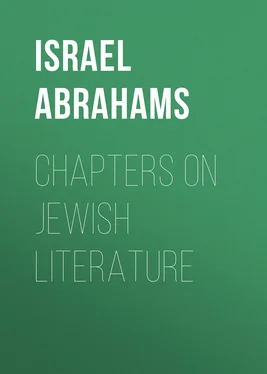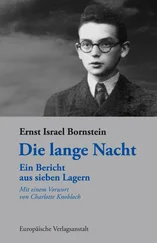Israel Abrahams - Chapters on Jewish Literature
Здесь есть возможность читать онлайн «Israel Abrahams - Chapters on Jewish Literature» — ознакомительный отрывок электронной книги совершенно бесплатно, а после прочтения отрывка купить полную версию. В некоторых случаях можно слушать аудио, скачать через торрент в формате fb2 и присутствует краткое содержание. Жанр: foreign_prose, foreign_antique, на английском языке. Описание произведения, (предисловие) а так же отзывы посетителей доступны на портале библиотеки ЛибКат.
- Название:Chapters on Jewish Literature
- Автор:
- Жанр:
- Год:неизвестен
- ISBN:нет данных
- Рейтинг книги:4 / 5. Голосов: 1
-
Избранное:Добавить в избранное
- Отзывы:
-
Ваша оценка:
- 80
- 1
- 2
- 3
- 4
- 5
Chapters on Jewish Literature: краткое содержание, описание и аннотация
Предлагаем к чтению аннотацию, описание, краткое содержание или предисловие (зависит от того, что написал сам автор книги «Chapters on Jewish Literature»). Если вы не нашли необходимую информацию о книге — напишите в комментариях, мы постараемся отыскать её.
Chapters on Jewish Literature — читать онлайн ознакомительный отрывок
Ниже представлен текст книги, разбитый по страницам. Система сохранения места последней прочитанной страницы, позволяет с удобством читать онлайн бесплатно книгу «Chapters on Jewish Literature», без необходимости каждый раз заново искать на чём Вы остановились. Поставьте закладку, и сможете в любой момент перейти на страницу, на которой закончили чтение.
Интервал:
Закладка:
The book opens with an invocation:
Hear, people of proud Asia, Europe, too,
How many things by great, loud-sounding mouth,
All true and of my own, I prophesy.
No oracle of false Apollo this,
Whom vain men call a god, tho' he deceived;
But of the mighty God, whom human hands
Shaped not like speechless idols cut in stone.
The Sibyl speaks of the true God, to love whom brings blessing. The ungodly triumph for a while, as Assyria, Media, Phrygia, Greece, and Egypt had triumphed. Jerusalem will fall, and the Temple perish in flames, but retribution will follow, the earth will be desolated by the divine wrath, the race of men and cities and rivers will be reduced to smoky dust, unless moral amendment comes betimes. Then the Sibyl's note changes into a prophecy of Messianic judgment and bliss, and she ends with a comforting message:
But when all things become an ashy pile,
God will put out the fire unspeakable
Which he once kindled, and the bones and ashes
Of men will God himself again transform,
And raise up mortals as they were before.
And then will be the judgment, God himself
Will sit as judge, and judge the world again.
As many as committed impious sins
Shall Stygian Gehenna's depths conceal
'Neath molten earth and dismal Tartarus.
But the pious shall again live on the earth,
And God will give them spirit, life, and means
Of nourishment, and all shall see themselves,
Beholding the sun's sweet and cheerful light.
O happiest men who at that time shall live!
The Jews found some consolation for present sorrows in the thought of past deliverances. The short historical record known as the "Scroll of Fasting" ( Megillath Taanith ) was perhaps begun before the destruction of the Temple, but was completed after the death of Trajan in 118. This scroll contained thirty-five brief paragraphs written in Aramaic. The compilation, which is of great historical value, follows the order of the Jewish Calendar, beginning with the month Nisan and ending with Adar. The entries in the list relate to the days on which it was held unlawful to fast, and many of these days were anniversaries of national victories. The Megillath Taanith contains no jubilations over these triumphs, but is a sober record of facts. It is a precious survival of the historical works compiled by the Jews before their dispersion from Palestine. Such works differ from those of Josephus and the Sibyl in their motive. They were not designed to win foreign admiration for Judaism, but to provide an accurate record for home use and inspire the Jews with hope amid the threatening prospects of life.
Josephus.
Whiston's English Translation, revised by Shilleto (1889).
Graetz.—II, p. 276 [278].
Sibylline Oracles.
S.A. Hirsch.— Jewish Sibylline Oracles, J.Q.R. , II, p. 406.
CHAPTER III
THE TALMUD
I (220-280) Palestine—Jochanan, Simon, Joshua, Simlai; Babylonia—Rab and Samuel.
II (280-320) Palestine—Ami, Assi, Abbahu, Chiya; Babylonia—Huna and Zeira.
III (320-380) Babylonia—Rabba, Abayi, Rava.
IV (380-430) Babylonia—Ashi (first compilation of the Babylonian Talmud).
V and VI (430-500) Babylonia—Rabina (completion of the Babylonian Talmud).
The Talmud , or Gemara ("Doctrine," or "Completion"), was a natural development of the Mishnah. The Talmud contains, indeed, many elements as old as the Mishnah, some even older. But, considered as a whole, the Talmud is a commentary on the work of the Tannaim. It is written, not in Hebrew, as the Mishnah is, but in a popular Aramaic. There are two distinct works to which the title Talmud is applied; the one is the Jerusalem Talmud (completed about the year 370 C.E.), the other the Babylonian (completed a century later). At first, as we have seen, the Rabbinical schools were founded on Jewish soil. But Palestine did not continue to offer a friendly welcome. Under the more tolerant rulers of Babylonia or Persia, Jewish learning found a refuge from the harshness experienced under those of the Holy Land. The Babylonian Jewish schools in Nehardea, Sura, and Pumbeditha rapidly surpassed the Palestinian in reputation, and in the year 350 C.E., owing to natural decay, the Palestinian schools closed.
The Talmud is accordingly not one work, but two, the one the literary product of the Palestinian, the other, of the Babylonian Amoraim . The latter is the larger, the more studied, the better preserved, and to it attention will here be mainly confined. The Talmud is not a book, it is a literature. It contains a legal code, a system of ethics, a body of ritual customs, poetical passages, prayers, histories, facts of science and medicine, and fancies of folk-lore.
The Amoraim were what their name implies, "Expounders," or "Discoursers"; but their expositions were often original contributions to literature. Their work extends over the long interval between 200 and 500 C.E. The Amoraim naturally were men of various character and condition. Some were possessed of much material wealth, others were excessively poor. But few of them were professional men of letters. Like the Tannaim, the Amoraim were often artisans, field-laborers, or physicians, whose heart was certainly in literature, but whose hand was turned to the practical affairs of life. The men who stood highest socially, the Princes of the Captivity in Babylonia and the Patriarchs in Palestine, were not always those vested with the highest authority. Some of the Amoraim, again, were merely receptive, the medium through which tradition was handed on; others were creative as well. To put the same fact in Rabbinical metaphor, some were Sinais of learning, others tore up mountains, and ground them together in keen and critical dialectics.
The oldest of the Amoraim, Chanina, the son of Chama, of Sepphoris (180-260), was such a firm mountain of ancient learning. On the other hand, Jochanan, the son of Napacha (199-279), of dazzling physical beauty, had a more original mind. His personal charms conveyed to him perhaps a sense of the artistic; to him the Greek language was a delight, "an ornament of women." Simon, the son of Lakish (200-275), hardy of muscle and of intellect, started life as a professional athlete. A later Rabbi, Zeira, was equally noted for his feeble, unprepossessing figure and his nimble, ingenious mind. Another contemporary of Jochanan, Joshua, the son of Levi, is the hero of many legends. He was so tender to the poor that he declared his conviction that the Messiah would arise among the beggars and cripples of Rome. Simlai, who was born in Palestine, and migrated to Nehardea in Babylonia, was more of a poet than a lawyer. His love was for the ethical and poetic elements of the Talmud, the Hagadah , as this aspect of the Rabbinical literature was called in contradistinction to the Halachah , or legal elements. Simlai entered into frequent discussions with the Christian Fathers on subjects of Biblical exegesis.
The centre of interest now changes to Babylonia. Here, in the year 219, Abba Areka, or Rab (175-247), founded the Sura academy, which continued to flourish for nearly eight centuries. He and his great contemporary Samuel (180-257) enjoy with Jochanan the honor of supplying the leading materials of which the Talmud consists. Samuel laid down a rule which, based on an utterance of the prophet Jeremiah, enabled Jews to live and serve in non-Jewish countries. "The law of the land is law," said Samuel. But he lived in the realms of the stars as well as in the streets of his city. Samuel was an astronomer, and he is reported to have boasted with truth, that "he was as familiar with the paths of the stars as with the streets of Nehardea." He arranged the Jewish Calendar, his work in this direction being perfected by Hillel II in the fourth century. Like Simlai, Rab and Samuel had heathen and Christian friends. Origen and Jerome read the Scriptures under the guidance of Jews. The heathen philosopher Porphyry wrote a commentary on the Book of Daniel. So, too, Abbahu, who lived in Palestine a little later on, frequented the society of cultivated Romans, and had his family taught Greek. Abbahu was a manufacturer of veils for women's wear, for, like many Amoraim, he scorned to make learning a means of living, Abbahu's modesty with regard to his own merits shows that a Rabbi was not necessarily arrogant in pride of knowledge! Once Abbahu's lecture was besieged by a great crowd, but the audience of his colleague Chiya was scanty. "Thy teaching," said Abbahu to Chiya, "is a rare jewel, of which only an expert can judge; mine is tinsel, which attracts every ignorant eye."
Читать дальшеИнтервал:
Закладка:
Похожие книги на «Chapters on Jewish Literature»
Представляем Вашему вниманию похожие книги на «Chapters on Jewish Literature» списком для выбора. Мы отобрали схожую по названию и смыслу литературу в надежде предоставить читателям больше вариантов отыскать новые, интересные, ещё непрочитанные произведения.
Обсуждение, отзывы о книге «Chapters on Jewish Literature» и просто собственные мнения читателей. Оставьте ваши комментарии, напишите, что Вы думаете о произведении, его смысле или главных героях. Укажите что конкретно понравилось, а что нет, и почему Вы так считаете.












